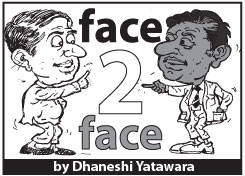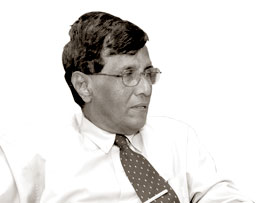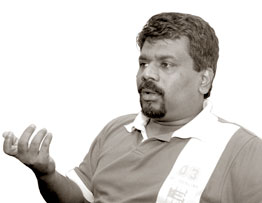'Varsity politics, Yes but... no violence
 Crises
arise in our universities every now and then. To many the politicization
is the underlying cause. Here are the views expressed by former
university don and academic, Prof. Jagath Wickramasinghe and JVP MP,
Anura Kumara Dissanayake. Crises
arise in our universities every now and then. To many the politicization
is the underlying cause. Here are the views expressed by former
university don and academic, Prof. Jagath Wickramasinghe and JVP MP,
Anura Kumara Dissanayake.
How do you see university students' involvement in politics?
Prof. Jagath Wickramasinghe - Former Vice Chancellor of Sri
Jayewardenepura University of Sri Lanka / Director General, National
Institute of Education:
That has been there for quite a long time. I think the current
'crisis' is partly due to this politicisation. But there are more
important factors as well. I have experience for over 35 years in the
universities as an academic as well as a student. I believe students
should get involved in politics. University means gaining the universal
knowledge. So, if some students are interested in politics, then they
should take part in politics. Students have full freedom to do so. Those
are part and parcel of a university life. But too much involvement can
damage their studies. That should be kept in mind.

Prof. Jagath Wickramasinghe - Former Vice Chancellor of Sri
Jayewardenepura University of
Sri Lanka / Director General, National Institute of
Education |

JVP MP Anura Kumara Dissanayake |
JVP MP Anura Kumara Dissanayake: University students must
participate in politics - as they are educated and matured people. Such
independent approaches are necessary for the political culture of the
country where we mostly see people entering politics with an equal
family background. This has obstructed the country's forward march. New
people with independent ideas and thoughts must enter in to active
politics. It is required for the all-sector development of the country.
University students' active participation in politics is essential in
this backdrop.
What difference do you see in the past and the present situations?
Prof. Jagath Wickramasinghe: Now the students have become bit
more violent. When people find that they cannot get things done properly
and peacefully, they resort to violence. University education means
gaining the universal knowledge.
So, if some students are interested in politics then they should take
part in politics. I can remember, my friend late Prof. Osmand Jayarathne
once told me that when he was a temporary lecturer he was chased out of
the University for taking part in a May Day rally. Those days, May Day
was not a holiday.
Students were involved in politics even in those days. But violence
was not so widespread like today. They were not selfish.
They strongly believed in an ideology. But today along with the
problems the students face, they think by getting linked up with a
powerful political party they can fulfil their targets.
JVP MP Anura Kumara Dissanayake: There is a difference.
University is not an isolated institute. It also reflects the changes
and 'dramas' of the common society we live in. It cannot exist like
that. Universities are a cross section of our society.
Massive irregularities started taking place in the society after the
open economy invaded our culture and our society. University has no
escape as it is part and parcel of the society. All these misshapes are
reflected in the university system as well.
The changes we see in the University system consist both plus and
minus points. There is a huge difference between the knowledge levels of
the world and our university system.
This gap creates a knowledge thirst among the students. They are
compelled to fulfil this requirement even from resources external to the
University.
Don't you think intense politicisation of the University system is
a massive obstruction for its proper functioning?
Prof. Jagath Wickramasinghe: Well it is, I would say. But we
have to understand sources for these rising as well. I would say
University students, under these circumstances are under 'frustration'.
So when we are dealing with them at a point their frustrations would
also erupt. If these children's perception is that they have no future
and only hope is going after a politician it is difficult to stop these
things.
Their basic requirements should be fulfilled to make them focus on
their studies. I believe we are just scratching the surface of the
problem. But this does not mean that students are correct all the time.
They have to fulfil their duty as well by concentrating on their
studies.
JVP MP Anura Kumara Dissanayake: Not at all. These student
activities through student unions are healthy approaches. Tutors of
universities do not have any other bond with students except for giving
lectures.
In such scenario it is important for students to have togetherness.
When these youth enter universities they become very independent - even
from their parents. Many arrive from very rural villages.
As such, some guidance is essential and students' unions can play a
leading role there. If such control does not take place we would hear
worst news from the universities - much worse than what we hear.
What factors contribute to such chaos?
Prof. Jagath Wickramasinghe: The biggest problem students are
facing, as I see, is that they do not see a future other than students
of a few professional degree courses like medicine, engineering etc.
Students do not see any purpose in continuing higher studies. Unless
the economy expands a Government or the private sector cannot create job
opportunities. 90% of the students entering campus are either
pressurized from the parents, relations or their community. They spend
couple of years in the campus and at the end when they have to return
home without a job they feel it as a social stigma.
This can be a good breeding ground for politicians. These young
university students are energetic and can be easily motivated. I would
say almost all the political parties do this.
Some have failed but some militant political parties have taken a
significant number of students. To answer this problem, the other aspect
is, the teaching methodologies and curriculum in the campuses need to
change as well. If we can make the students think that there is a
purpose in their efforts politicians will have no chance to intervene.
JVP MP Anura Kumara Dissanayake: Personal experiences are a
major cause for many students to come in to politics. On the other hand
ideologies to change the present social context which is unjustifiable
and disparities with what is happening now also lead students
intervening in politics.
But again looking back we can see many students get involved in
politics mainly due to some of their personal experiences. The life of
university students are going through is very pathetic at times.
They are facing a huge problem in finding accommodation - hostels,
insufficient number of tutors, lack of equipment and facilities and many
more. These challenges they encounter daily would definitely lead them
to intervene in politics in order to find an answer.
The discussions and debates taking place in the society on economic
and social irregularities, unwanted foreign interventions and all that
flow in to their sphere as well.
It is natural for those who are interested to intervene in such
issues. This is also a reason for the students to enter in to politics.
But this is not a negative approach. It should not be looked in to in
such manner.
For whatever reasons, many university students have become highly
politicised and it results in closing universities. Frequently, pausing
university education slows down producing graduates to the country.
Don't you agree it has a negative impact on the country's future? How do
you comment on this?
Prof. Jagath Wickramasinghe: It is true. But under the current
circumstances what service can a graduate contribute him or herself? The
impact to the society is minimum.
We need to produce a productive graduate. Unless that is done and we
need to address the main causes that can trigger agitation among the
students.
JVP MP Anura Kumara Dissanayake: As there is a delay in
producing graduates to the society a similar issue also comes in to play
as many of these graduates face unemployment.
Accelerated flow of graduates into the society is not a positive
step, all the time. The society only sees the conflicts taking place
within the universities. Many a time the reason behind all these
agitations does not get proper attention.
If someone thinks that politics is the reason behind, it is totally
false. Some capitalist political parties tend to intervene misusing such
instances. We accept that we also have a transparent student action
inside campuses. It is very disciplined and we can assure it.
Do social differences between the students play a major role in
creating disturbing situations causing strikes and agitations?
Prof. Jagath Wickramasinghe: I do not think so. That should
deter students getting together. If it so it would be difficult for the
students to come on to a common cause. This can cause a counter
reaction. Yet I do not think this a major factor.
JVP MP Anura Kumara Dissanayake: Well so far there isn't any
sociological study on that. Yes they come from many different social
levels and classes. Yet there is one similarity. Their education levels
and innovative thinking.
What ever the differences they are facing those are not so severe
leading to conflicts and agitations. It is a similar consequence we see
in the society.
We often see those student activists change their ideologies once
they come out of the university, as they gain power and money. Why
cannot they stick to their former ideologies?
Prof. Jagath Wickramasinghe: This is a common factor in the
third world. We are living in two worlds. Our inner world and outer
world. Most of the youth also fall into this category.
Sometimes they would think they should become militant and radical to
get the attention of others. But when they go out to the world they see
a different surrounding.
One needs to make money and try to maintain a certain social status.
That is why it happens. A person has a right to change. If these changes
are on selfish reasons, then that is wrong.
JVP MP Anura Kumara Dissanayake: A university student when
inside the university one can not treat him or her as an isolated
element. They also have their target and they struggle together to
achieve them.
Yes some withdraw from this track when they pass out from the
University. Reason is when they are inside the society they have to
struggle alone. They get burdened with personal duties and
responsibilities. It becomes a different challenge for them. This
happens to some of them and not for all. It is a common sight in the
society as well.
|
